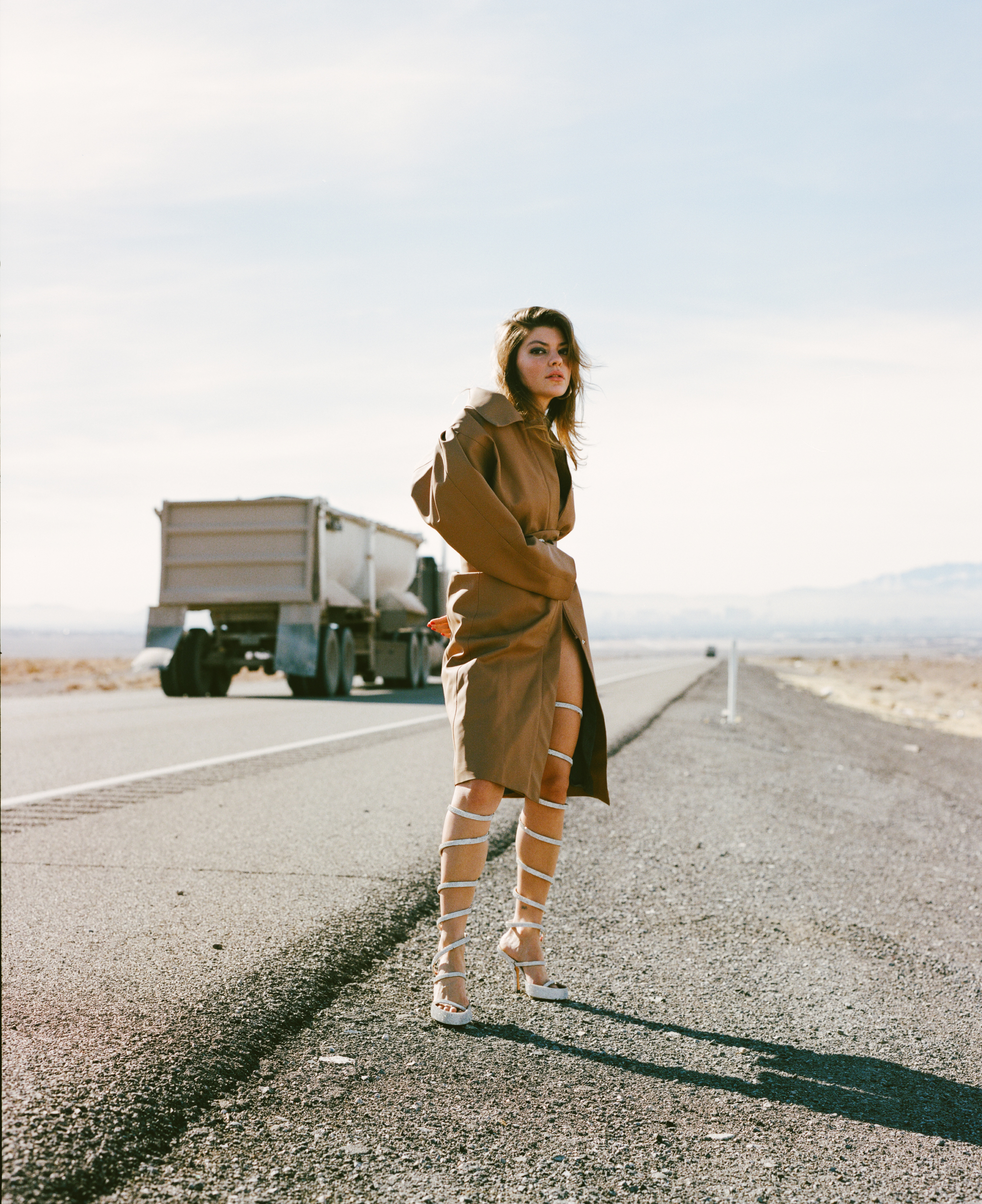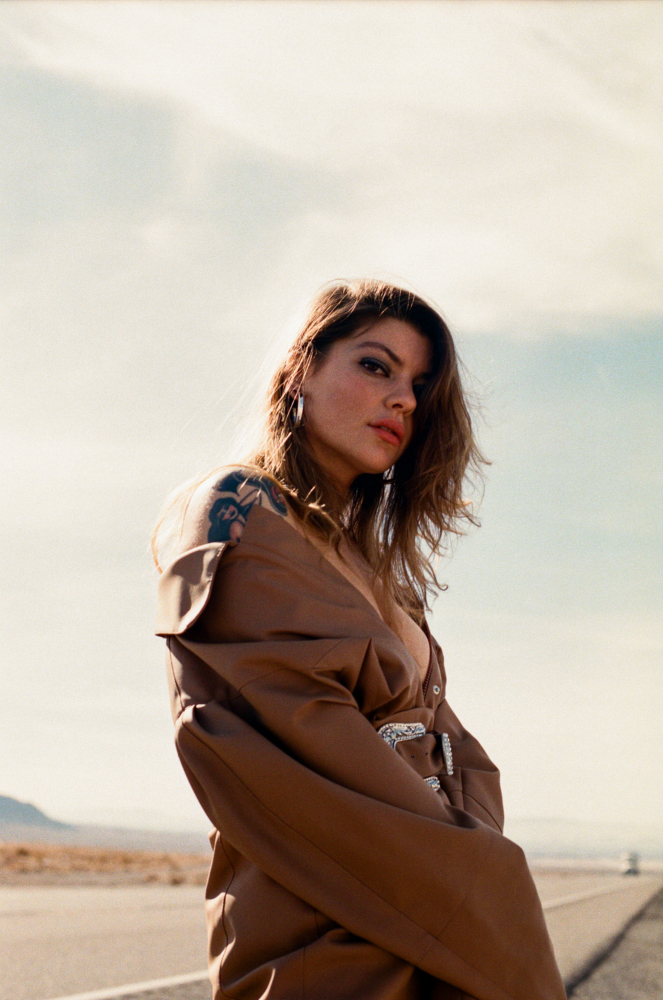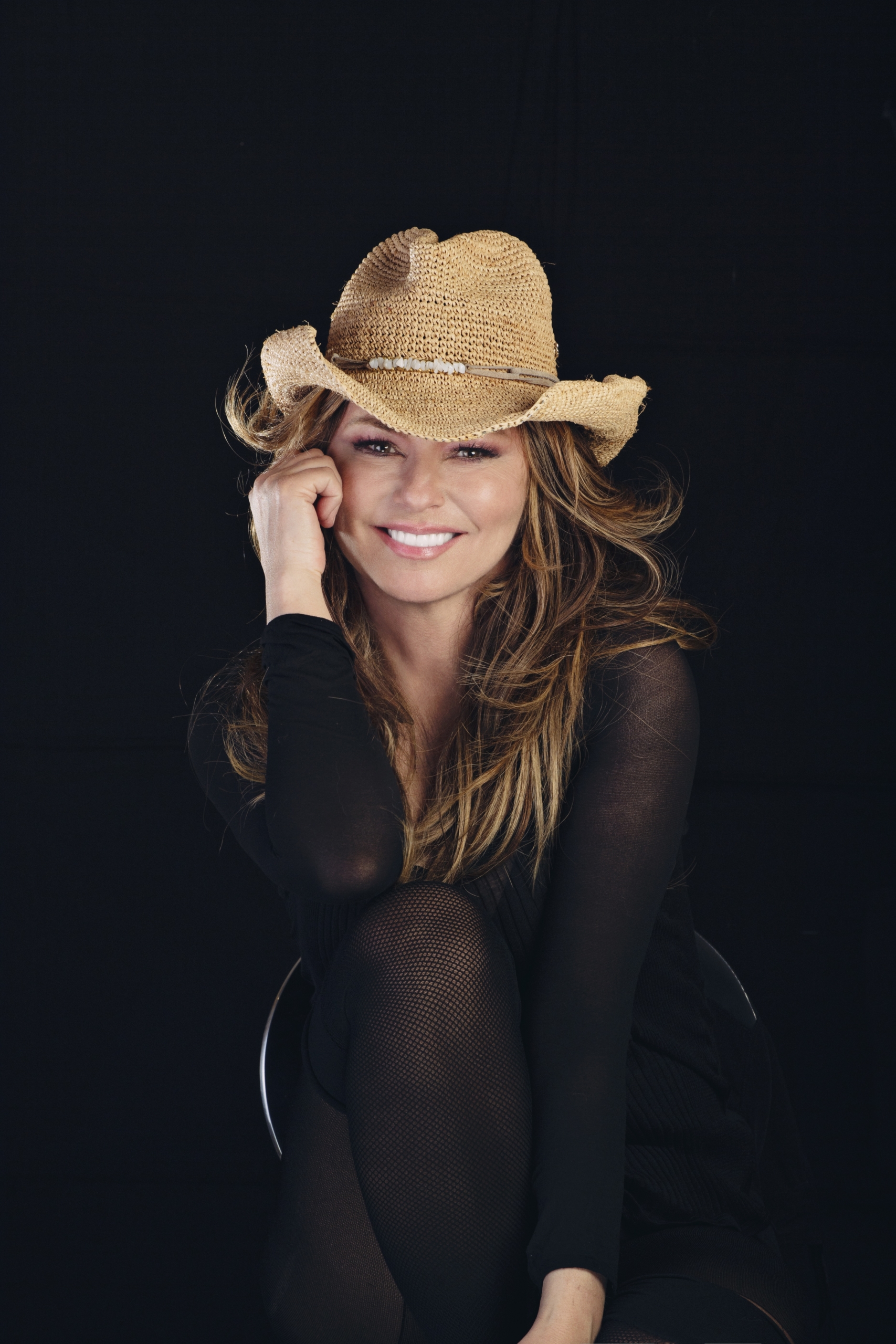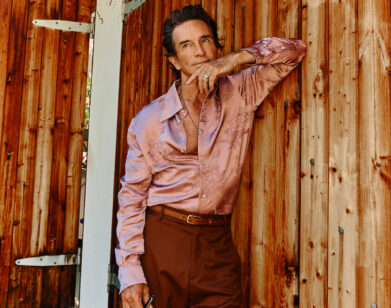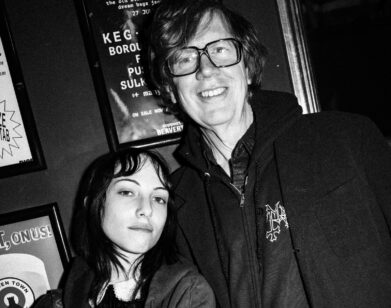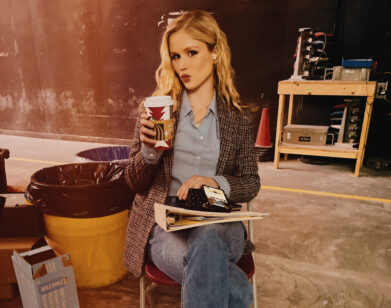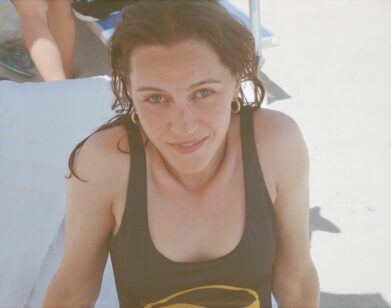Donna Missal and Shania Twain on Creative Freedom and Owning Their Sexuality
“Sometimes burning shit down to get a clear view of the possibilities moving forward can be the most cathartic experience,” explains Donna Missal, a singer-songwriter from New Jersey, during a Zoom interview with her childhood musical idol and newest fan, the country music legend Shania Twain. The 29-year-old musician is talking about Lighter, her second full-length album (out Friday), which details, in ten scorching songs, the journey of surviving a breakup. Much has changed for Missal since the viral success of 2016’s “Keep Lying,” a song equal parts emotion and brain, which opened way for her first full-length record This Time and her first experience touring, ever. Despite her newness to the industry, music runs deep in her veins; her father was a drummer in the ’80s and her grandmother a songwriter in the ’50s. Her ability to express mundane emotions with “resonance,” as Twain describes it, is a rare gift.
Though the post-breakup album is an inevitable must in any musician’s career, Missal’s thunderous vocals, mixed with her poignant lyrics and a country-meets-90s rock attitude, transformed the record into a wildfire of emotional upheaval making way for growth accompanied by a newfound sense of creative empowerment; one that comes from being in full control of her story. As she tells her musical idol, “part of knowing you’re in control is making decisions for yourself.” A few weeks before the release of Lighter, Missal met Twain over Zoom, where they discussed creative control, the healing power of music, leopard print fashion, and lighting shit on fire. Let’s go girls. —ERNESTO MACIAS
———
SHANIA TWAIN: First of all, it’s so awesome to see you while I’m speaking to you. I just want to start by saying you’re amazing. Holy shit. I’m so inspired by your voice and your writing. I’m listening to your lyrics, and I’m like “Oh, god. This is going to inspire my writing.”
DONNA MISSAL: What?
TWAIN: I’m in the middle of making an album right now. There are some lyrics on your new album that are very much in the vein of what I’ve been writing. Now I’m thinking, “Shit. Do I tell her that now so she doesn’t think I’ll take it.” No, I’m just kidding. I feel like I’m in tune with you and your thinking.
MISSAL: I’m so honored by that. I had no idea that you heard the record. You just made my life.
TWAIN: I’m thinking, “Is she really writing this stuff?” It’s strong and it’s catchy too, and it’s all the musical things that make you want to listen. Of course, as a writer, I’m listening to your lyrics and moved by them. I don’t want to jinx anything, but it’s going to be a really successful time for you. Are you planning to tour shortly after the release, or what?
MISSAL: I won’t be able to tour it until the new year. So there’s going to be all this time between the record coming out and being able to tour it.
TWAIN: It means an advantage.
MISSAL: You think?
TWAIN: Not that my opinion matters here because it’s you and you’re yourself. Being able to communicate yourself prior to a tour on the merit of the music alone and your creative vision, because I also know that you like directing your videos and stuff, right?
MISSAL: Yes.
TWAIN: I think the more people know you once you are on the stage, the better it’s going to be anyway. If you’re not touring, what are you doing?
MISSAL: If I’m not touring, I’m getting ready for touring or working on a body of work. I haven’t spent much time not touring in the last two years. But prior to that, I had never toured before at all in my life. My first record was my very first tour ever.
TWAIN: Do you enjoy touring?
MISSAL: I enjoy the performance. It’s one of my purposes. Performing does something for me that nothing else does. But being on tour, not necessarily. I find it really difficult. I do enjoy the challenge, but it’s not necessarily the most conducive to my lifestyle. Touring is so much less like rock and roll—it’s not a party. It’s really difficult and strenuous. Especially because of the music that I write. I’ve always challenged myself vocally and physically. Then I get on tour and realize I have to do this every day.
TWAIN: Stamina is a whole other part of live performance. Are you trying to be exactly like the record? What’s your take?
MISSAL: I love live modifications. I feel like that’s the best part of going to a show: seeing what the artist can do. I love doing stuff like that. It also helps me with being re-inspired every time I get on stage to try something new and take a risk. I don’t drink alcohol. I don’t smoke weed. I don’t smoke cigarettes. I just treat it like a job, and I take the job so seriously. A bad performance will fuck me up mentally.
TWAIN: As people get to know your music better as well, I know they already are, but more and more you’ll be looking into the eyes of the audience knowing that they completely get you and understand you. I love listening to your voice. I’d listen to you all day. You’re singing about such profound and meaningful things.
MISSAL: I’ve been writing songs since I was a really little kid, but I don’t think that I understood what I was doing. You know when you’re doing something and there’s not an emphasis on “What am I doing and why?” You’re doing it because it’s visceral. It’s just happening.
TWAIN: You’re just making up stories because you haven’t lived it yet. So would you consider yourself a songwriter or a singer first?
MISSAL: My writing has always come from vocalizing. I don’t know if you feel the same way, but sometimes the song writes itself. The words are already in there, the voice acts as this carrier for whatever it is that you’re feeling. I found that my voice is my access point to the way that I feel. I have always had this connection to my voice that I’ve never really been able to understand. I know that when I am using my voice, that’s when I have the closest connection to who I feel like I really am and my soul.
TWAIN: It’s resonance. As you know, there are so many incredible voices out there. They don’t write what they sing, so they’re always interpreting. You’re one of the lucky ones who does it all, and does it so well. As you experiment with your voice—a high note, a low note—it’s a dance between your heart, your mind, your voice, and your experiences.
MISSAL: I do think that the power of the voice to access emotions in other people is really powerful. Sometimes it goes beyond what the lyric is about. Interpretation is everything.
TWAIN: People have to be able to sing along even if they can’t sing. A lot of my fans don’t speak English, so they’re singing along phonetically. Whatever emotion or interpretation that they’re feeling from the music is not because they actually understand exactly what I’m saying. I think that the true skill in writing is not about necessarily being really great at putting words together. It’s really about creating a resonating emotion.
On your new album, Lighter, do you feel like it’s a real expression of you as a person? Because you’re not just a singer, you’re the writer, and there’s all kinds of genre-crossing and really incredible diversity in there. It’s country, it’s rock, it’s soul. One minute I’m in [Janis] Joplin world for about two seconds, and then all of a sudden I’m in another world. I’m just curious. What were you thinking as far as direction?
MISSAL: I love this question. When I first started writing some of these songs that ended up being on the record, I was sort of writing myself through something that was really difficult. I was experiencing something and I was going to sessions and sort of letting it come out of me.
TWAIN: Can you say what that is?
MISSAL: I was going through this super traumatic breakup, feeling like my life was literally burning the fuck down around me. I was watching these facets of my life that I had relied on for so long disappear. I was also working, writing, and touring at that time. I think it was this instinctual thing to work through that by writing music about it. When it became apparent that I was writing songs that I wanted to share with people, I started creating more of a framework for it. Ironically, talking to you is kind of blowing my mind because I set out to make a record that sounds like, and I shit you not…
TWAIN: Don’t shit me.
MISSAL: I wanted Lighter to sound like if Shania Twain and Sheryl Crow were the lead singers of a band made up of Nirvana, the Smashing Pumpkins, and Oasis. That was my framework for this record.
TWAIN: That’s awesome.
MISSAL: Now that I’m speaking to you, I’m a little overwhelmed. That framework really made it so that any time there was a question—vocally, musically—all of those questions were answered by referring to this framework. That’s really what saved the experience for me because it made it about something that was based on the things that have really influenced the way that I sing and write throughout my entire life.
TWAIN: It’s very sensitive. Vocally, of course, there’s so much dynamic there, but even in the production, I think that it’s quite sensitive and highlights you well. But it kicks ass at the same time. I look for that. I want to be slapped in the face when I’m listening to music. I want to go “Shit! I wish I would’ve thought of that. Why didn’t I think of that?” We all need to be inspired. Everything on that album will do it. So congratulations to you.
MISSAL: I was concerned when I was writing the record, getting towards the end of the process thinking, “Is this what people need right now? Am I serving a purpose that I can stand behind?” I realized that by being as vulnerable and honest as possible and putting my shit out there—that would probably be what someone needs more than anything else that I could offer as a person or as an artist.
TWAIN: Let’s talk about this leopard print sheer outfit. Because I, myself, feel so strongly about self-expression—it has to come from you. You can’t let anybody else dictate what you should look like, what you should sound like. As sexy as it is, because it’s like really hot. But it looks like you’re comfortable in your own skin. At least that’s what you make me feel like when I watch that. I remember that when I came out, I wasn’t thinking about what was acceptable, I didn’t even think that anything I was doing was unacceptable. I was criticized for being too sexy, or the beauty and fashion overshadowing the music. To me, these go hand in hand. This is all part of it. It’s a whole thing. What I was warned about was, “It’s going to be too sexy. You’re going to offend men and women. You’re going to offend the women because it’s too sexy, and then you’re going to offend men because of all the things that you’re saying.” I didn’t see it that way because those weren’t my intentions. I was being honest and sincere.
MISSAL: You have always been an example of that to me. It’s amazing to hear you say that there was opposition and doubt about these choices that you were making. Even today, however many years after you were having those conversations, those same conversations are still happening. It’s either about sexualizing something, or you better not sexualize it at all. There’s no in-between.
TWAIN: You just gotta keep those doors down.
MISSAL: That bodysuit was a direct homage to you. Sexuality is normal. It deserves to be normalized. I’m not trying to say anything about my sexuality, except that I experience sexuality. I shouldn’t feel any shame about that. No one should feel shame for that. It’s one of the most human things that you can feel and experience. I would love to watch it continue to be de-stigmatized. The only way that that happens is by representing that as fervently as possible, time and time again.
TWAIN: I love what you’re doing. At first, I was into all the music anyway, but then I saw that video and I thought, “This is just a natural segue and expression of the song.” You look relatable, you look touchable, you look huggable. I was proud of you. That sounds weird because we don’t know each other, but I was proud of that for another woman. It was just beautiful.
MISSAL: Thank you so much. Every person deserves to watch something and feel represented. That’s all you can do as an artist, especially if you are making creative decisions.
TWAIN: I know you were involved with directing, so how do you go about directing that kind of vision?
MISSAL: I write a treatment and I put together a visual storyboard with some text, and I really think about how I want something to look and feel to the viewer. Then I just get people involved that I trust. Everything that I do is so collaborative.
TWAIN: How can you know all this already? You’re too young to know all this already.
MISSAL: I just know what I’m good at, and I know what other people are good at. When those things can come together, that’s when the best result comes out. I just found out recently that you’re creative directing your Las Vegas residency. That’s a massive production. What led you to make that decision?
TWAIN: I’ve always been creatively involved right from the beginning. In Nashville, you know, they used to operate, I think they still do, where they have the little creative groups that they assign to you. I just didn’t see it. I just said, “Trust me, let me do this my way. Give me a small budget.” I went and shopped for my own clothes. The first couple of videos, they were just very Walmart-y type clothes. I didn’t want to spend the budget on clothes. I would take a shot, and then I would go look through the camera. It was a very slow process, but I needed to understand how the lighting worked, where the camera was going to go, what time of day I wanted it to be. “Whose Bed Have Your Boots Been Under,” for example, that’s a braless video. It’s a K-Mart dress, no bra.
MISSAL: You directed your music videos?
TWAIN: The art direction has always been me.
MISSAL: That’s incredible.
TWAIN: Once I could afford more, then I could bring in an actual clothes designer. I would go into his workroom and I would choose fabrics. I like the tactile involvement. Getting to the show, it was the same thing. I like the engineering element of things. So much of it is done before we even need to be in the same room. I’ve also edited all my videos as well, which I recommend. I think you should be editing your own videos. Because if you already have the whole vision in mind, you’re the only one that’s going to know when you’ve achieved it.
MISSAL: I don’t remember that ever being a part of the publicity around your videos or your records. I don’t know why that’s not common knowledge. I feel so empowered to know that you do that and that you’ve done that through your entire career. That leaves an impact on me as a fan and a creator, to know that not only is it possible but that you made it possible, especially during a time when we just weren’t seeing that commonly done. I can’t tell you how valuable it is for me as a woman in this industry trying to do the things that I want to do, trying to accomplish things in a hands-on way, to know that there are artists like you that are doing it.
- Photo by ALex harbaugh.
TWAIN: The more responsibility you take, the more risk you take. You’re a strong, courageous person. You are already being very bold. You need to go further. There’s so much more you can get out of your art if you’re involved. Maybe that’s why it feels so revealing. I would never do anything if I wasn’t comfortable with it. I have my own boundaries. Everyone does.
MISSAL: A lot of times the things that I wear on stage or in a video, I would never wear in my real life. I wear sweatpants, t-shirts, and I fucking hate bras. I don’t like to wear makeup. It’s not that it isn’t me, it’s just this different facet of me. It’s this facet that I don’t exercise every day, but it doesn’t feel like I’m not being myself when I am exhibiting or exuding sexuality. That bodysuit was completely sheer. Part of knowing you’re in control is making decisions for yourself. I feel really inspired and excited.
TWAIN: It takes courage. Control is not a negative word, but I think that we all deserve safety. If you push the boundaries within your own comfort zone, you learn so much about yourself. Let’s go there, Donna: the title of the album Lighter, what brought you to that title? I don’t want to say what it sounds like. I want to just hear what it is.
MISSAL: I’ve found that when I started telling people what the title was, within my circle, a lot of the feedback was like “Oh cool. Like you know, being relieved of like weight and feeling weightlessness.” I get that. Actually, what it meant when I was writing these songs, I decided that the album should be called Lighter before I finished writing the songs. I was thinking of the concept of literally burning shit down around you.
TWAIN: Yes! I should’ve said what I thought first. I thought exactly that. I didn’t have any idea what your actual personality would be like in a conversation. But there’s confidence in the album. There’s a conviction in there. Even if you are addressing insecurities, you can do that and not be weak. Even though it sounds cathartic, the first thing I went to was: light it up. Fuck yeah.
MISSAL: I think it’s so important that the message of this record doesn’t come across as pitiful or sorry for myself. Because that’s not the point. The point is so much more about, you can watch your entire life burn down around you, you can walk through that experience, and you’re going to get to a point where you’re going to look back on that destruction and realize you are so much better off on the other side of that. Sometimes burning shit down around you to get a clear view of the possibilities moving forward, can be the most cathartic experience.
TWAIN: There’s a deep emotional maturity in you that is clear in your music. Where does this come from?
MISSAL: I don’t know, man. I definitely can appreciate that growing up, being creative and expressive was celebrated. I don’t think that’s the case in so many homes. There’s such an emphasis, especially in the US on “get a job, go to school.” The process is very rudimentary, and there’s a big emphasis on that culturally. When I am singing, I feel like I know who I am. That’s not how I feel on a daily basis. There are still difficult days, and it’s a process.
TWAIN: It’s an incredible gift because you can soothe yourself.
MISSAL: I have to tell you this: your album “Come On Over” was the very first album I ever owned in my entire life. My father bought it for me. He took me to a record store in my town in New Jersey. I was eight years old. We got in the car, and I opened it up right away. We got to my house by the second song, and he just kept looping around our neighborhood until the whole record was done. I’ve been obsessed with it ever since. It has informed so many of the decisions that I’ve made as a creative person throughout my life.
TWAIN: I love that story. I like and need to be reminded of what music means to others as well. I know what it means to me, but it’s important that I know how it affects them. We have to accept that as a responsibility.

